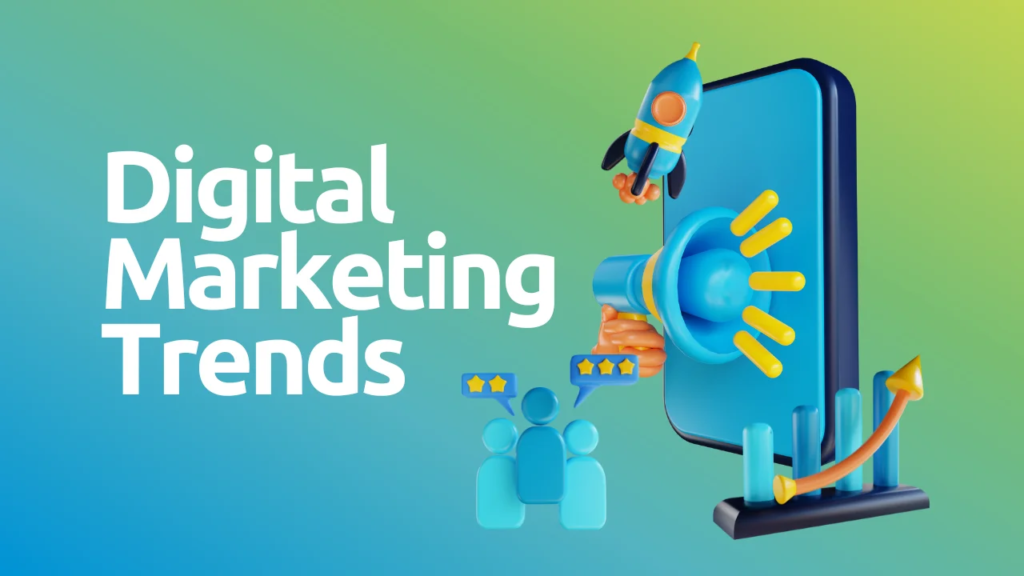In the ever-evolving sphere of digital marketing trends, a multitude of trends shape the landscape, steering strategies toward innovative and engaging avenues. From the dynamic realm of video content dominance to the nuanced embrace of AI and chatbots, the digital marketing arena pulsates with strategies designed to captivate and resonate with today’s diverse audience.
Video Content Dominance:
Video marketing has emerged as a formidable force, transcending platforms and captivating audiences through various formats. Short-form videos, live streams, and interactive content redefine brand narratives, creating dynamic visual stories that resonate with fast-paced marketing trends. Marketers are increasingly exploring immersive 360-degree videos and virtual reality experiences, pushing the boundaries of traditional video content.
Ephemeral Content:
The allure of ephemeral content, epitomized by the Stories feature on platforms like Instagram and Facebook, thrives on the principles of urgency and authenticity. Brands harness these transient posts to foster a sense of immediacy, engaging users with content that unfolds in real-time. Furthermore, digital marketing trends have evolved to include interactive elements within stories, encouraging direct engagement and feedback from the audience, thereby creating a two-way conversation.
AI and Chatbots:
Artificial intelligence (AI) and chatbots stand as stalwarts in enhancing user experiences. Their integration into digital marketing trends and strategies facilitates personalized interactions, quick responses, and streamlined communication, contributing significantly to improved user engagement. The latest trend involves leveraging AI to analyze vast datasets for predictive analytics, enabling marketers to foresee trends and tailor their strategies accordingly.
Voice Search Optimization:
The ascendancy of voice-activated devices has spurred the need for voice search optimization. Marketers are compelled to adapt SEO strategies to align with conversational and natural language, ensuring content remains accessible through voice searches. Beyond traditional voice search, the trend has evolved to include voice-activated commands for interactive and personalized user experiences within applications and websites.

Social Commerce:
The convergence of social media and e-commerce, known as social commerce, reshapes the digital shopping landscape. Platforms seamlessly integrate shopping features, enabling users to make purchases without leaving the familiar realms of their favorite social apps. The trend now extends to social commerce ecosystems, where influencers directly facilitate product sales through their curated content, creating a symbiotic relationship between influencers, brands, and consumers.
Interactive Content:
Interactive content, ranging from quizzes to polls and interactive videos, takes center stage in engaging audiences. Beyond passive consumption, this trend encourages active participation, transforming users from spectators into active contributors. Gamification has become a prevalent strategy, with brands incorporating interactive games and challenges to enhance user engagement and brand loyalty.
User-Generated Content (UGC):
User-generated content (UGC) emerges as a potent tool for brand advocacy. Brands actively encourage their customers to create content, fostering a sense of community and authenticity. UGC serves as a testament to real user experiences, building trust among potential consumers. The latest iteration of this trend involves incorporating UGC into augmented reality (AR) experiences, allowing users to interact with products in real time through their devices.
Personalization and Hyper-Targeting:
The era of personalization continues to thrive, with marketers harnessing advanced data analytics to tailor content based on user preferences, behaviors, and demographics. Hyper-targeting ensures that content resonates on a personal level, enhancing the overall user experience. The evolving trend now includes predictive personalization, where machine learning algorithms anticipate user preferences and deliver customized content in real time.

Augmented Reality (AR) and Virtual Reality (VR):
Augmented Reality (AR) and Virtual Reality (VR) technologies introduce immersive dimensions to marketing experiences. From interactive product simulations to captivating storytelling, brands leverage AR and VR to create memorable and engaging encounters with their audience. The latest trend involves incorporating AR try-on experiences, allowing users to virtually experience products before making purchasing decisions.
Inclusive Marketing:
In response to societal shifts, brands increasingly adopt inclusive marketing strategies. Diverse representation and inclusive messaging reflect a commitment to equality and resonate with audiences seeking authentic and representative brand narratives. The ongoing trend includes collaboration with influencers from diverse backgrounds, amplifying a broader range of voices and stories within brand narratives.
Content Clusters and Topic Clusters:
Search engine algorithms favor comprehensive and topic-focused content. The strategic creation of content clusters around central themes enhances search engine visibility, aligning marketing efforts with evolving SEO strategies. Marketers are now exploring semantic SEO, emphasizing the context and intent behind user searches, to enhance content relevance and search rankings.
Evolving SEO Strategies:
SEO strategies undergo continuous refinement, emphasizing user intent, mobile-first indexing, and Core Web Vitals. Marketers adeptly adapt to evolving search engine algorithms, ensuring content remains optimized for enhanced visibility and discoverability. The latest trend involves leveraging structured data and schema markup to provide search engines with richer context about the content, enhancing its chances of appearing in featured snippets and rich results.
In the dynamic realm of digital marketing trends, staying attuned to these trends is paramount. Whether navigating the captivating avenues of video content or delving into the intricacies of inclusive marketing, businesses embrace these trends as pivotal elements shaping their digital narratives. In this ever-evolving landscape, adaptability and a keen awareness of emerging trends form the bedrock of successful digital marketing strategies.




Leave a reply